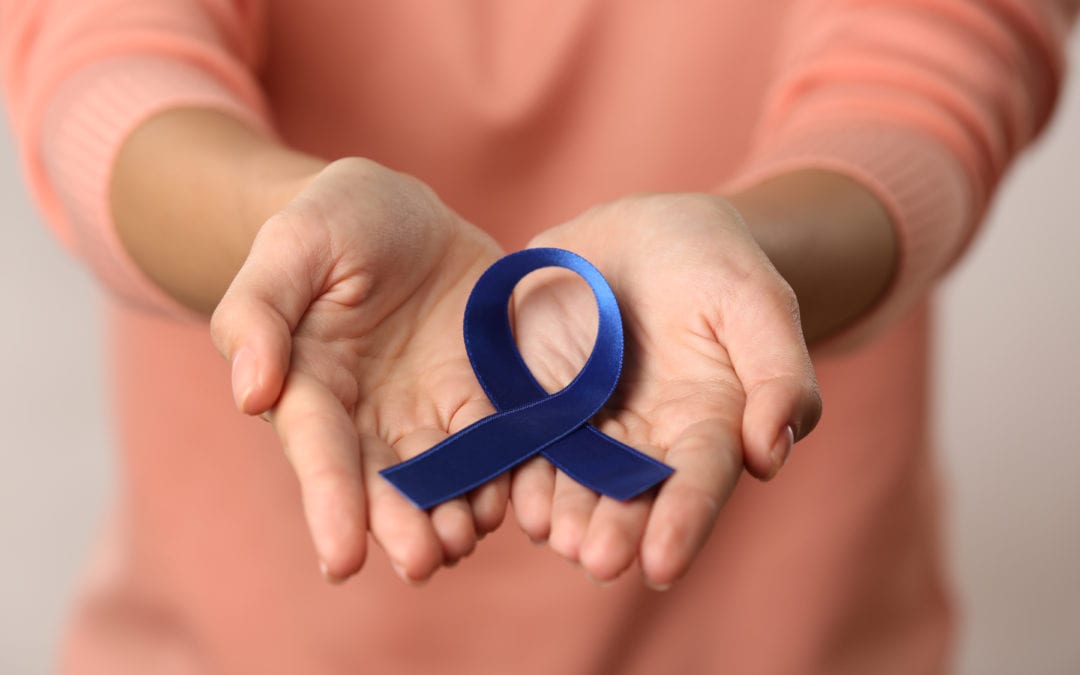While many of us have heard of—and maybe even donated to—Relay for Life, the signature fundraiser for the American Cancer Society which advocates for all types of cancer, one type we don’t hear about as often is colorectal cancer.
March marks the start of National Colorectal Cancer Awareness Month – a time for patients, survivors, family, caregivers and advocates to join together in spreading awareness about the disease. The first step in spreading awareness is education. In an effort to educate our community and spread awareness about the third most common cancer in the US and the second-leading cause of cancer death, we’ve put together a fact sheet on colorectal cancer.
What is colorectal cancer?
Colorectal cancer, more commonly known as colon cancer, occurs in the colon or rectum. Most cases of colorectal cancer first begin as polyps, small abnormal growths, on the inside of the colon or rectum which can become cancerous if left untouched.
Who is at risk for developing colorectal cancer?
Colon cancer affects men and women of all racial and ethnic groups. Although it can be diagnosed at a younger age, colorectal cancer is most commonly diagnosed in patients who are 50 years or older. In fact, more than 90 percent of all diagnosed patients are older 50 years of age. While more research is needed to better understand the underlying causes of colorectal cancer, some factors that may increase your risk of developing the disease include:
- 50+ years of age
- Family history of polyps
- Family history of colon or other types of cancers
- Ulcerative colitis or Crohn’s Disease
- Diets high in red meat and low in fiber
- Inactivity and obesity
- Smoking
Know the symptoms
Unfortunately, there are no standard symptoms associated with colorectal cancer. Not all diagnosed patients experience symptoms, so it’s important to be proactive and schedule regular screenings if you are over the age of 50. If symptoms do occur, they may include:
- Change in bowel movements – frequent diarrhea or constipation, etc.
- Abdominal pain – ongoing cramps, gas or bloating
- Rectal bleeding – finding blood in or on your stool
- Weakness or fatigue – may also be accompanied with nausea, vomiting or weight loss
These same symptoms can also be associated with a variety of other health conditions. It’s important to consult with your physician if you experience any abnormal changes in your bowel movements as they could be a sign of something more serious.
Get involved
Colorectal cancer takes the lives of more than 50,000 people each year, but that doesn’t have to be the case. When caught early, colorectal cancer is highly treatable, even in more difficult cases. Approximately six out of 10 deaths caused by colon cancer could be prevented if everyone over the age of 50 was screened regularly. This March, do your part in spreading awareness about this highly treatable and preventable disease by:
- Participating in a local awareness or advocacy event
- Donating to research and charitable organizations
- Spreading the word about colorectal cancer and the importance of regular screenings
Together, we can help to put a stop to this disease. Join us on Friday, March 3, 2017, for National Dress in Blue Day as we help to raise awareness about the risks and symptoms of this preventable disease. Something as simple as a routine screening can help to save lives across the nation, so let’s join together and get people checked! If you’re over 50, we encourage you to call or visit South Louisiana Medical Associates online to schedule your screening today.

